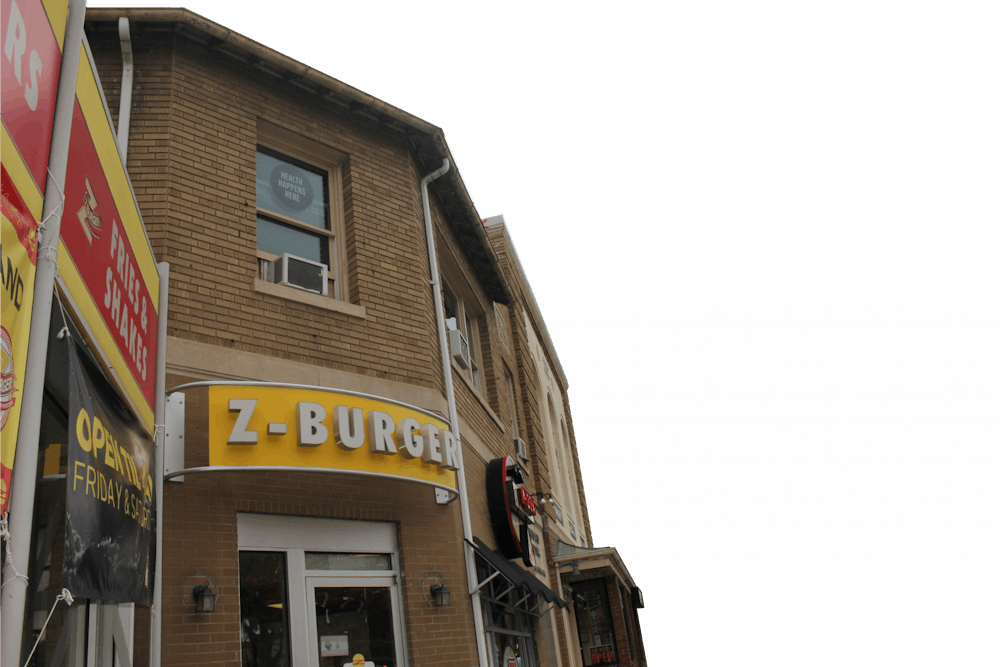From the Newsstands: This story appeared in our December 2021 print edition. You can find the digital version here.
The D.C. government announced in late May that businesses no longer had to implement restrictions to reduce the spread of the coronavirus, but Tenleytown business owners say that they didn’t see a full reopening until students returned to American University in August.
Postal service data shows how stay-at-home orders and social distancing shuttered over 400 D.C. businesses during the pandemic. Large swaths of employees working from home meant fewer on the streets to buy from restaurants, according to a study from consulting firm Ernst & Young. For Tenleytown’s businesses, a lack of student patronage after students were sent home in March 2020 spelled trouble.
Peter Tabibian, the owner of Tenleytown’s Z-Burger, said that his sales decreased by 70 percent during the pandemic — largely due to the University community’s absence.
“It was very tough,” Tabibian said. “We tried to stay open later and tried to make some money with longer hours. We started closing Friday and Saturday at 4 a.m. and we are still doing that now to make up for the loss of the business.”
Tabibian lost more money during the pandemic than he did when starting his business in 2008, he said.
The owners of Satay Club, an Asian-fusion restaurant in Tenleytown, also endured business hardships because of the pandemic. Edmond Goo, the son of Satay Club’s owners, said that the loss of student business during the pandemic was like what the restaurant faced when students left for summers pre-pandemic — but worse.
“Throughout our whole restaurant history, a lot of our customer base was AU students,” Goo said. “This was the first time we ever experienced a situation where there were no students. We lost a lot of customers when the students left.”
The pandemic didn’t only affect finances, it also changed how some of Tenleytown’s businesses are run.
“As a family, we just stuck together and tried finding ways to see what we could do for the restaurant,” Goo said. “We knew we had all this time when we weren’t busy so we decided to change how we function. We changed how we do take-out, and we changed up our menu, things like that.”
Despite financial hardships, Tabibian said he is proud to say that he did not shorten his hours or fire any employees to save on operational expenses.
“They helped us during the good times, so we tried not to cut any hours,” Tabibian said.
Now, with eased pandemic restrictions and students back on campus, some business owners say that they are beginning to financially reemerge from the pandemic.
“Business is getting a lot busier,” Tabibian said. “We’ve been doing much much better. We’re not back where we used to be, but we’re at least paying the bills and paying the rent and trying to catch up from the year and a half where that wasn’t that much business.”
To catch back up to where the restaurant used to be financially, Tabibian said he is keeping new restaurant hours implemented during the pandemic — which include a 4 a.m. closing time on Friday nights and Saturday nights — to encourage students to continue patronizing his restaurant.
Some of Tenleytown’s newer restaurant owners say that the pandemic did not bring challenges for them — namely Alex Massoudi, owner of Maman Joon Kitchen. The Persian restaurant opened in September, long after peak pandemic business closure. Despite the Delta variant prolonging the health crisis, Massoudi said that his new restaurant is “at normal size now.”
“To be truthful, I don't see it,” Massoudi said, referring to the effects of the pandemic. “Because of the food that we cater, it’s more homey food, so it’s not a sandwich or hamburger, so there’s a lot of takeout … The menu has a lot to do to that effect.”
Tabibian said he feels lucky to have made it through so far.
“The mayor is trying to protect the people but still, the landlord wants his rent, the suppliers want their money,” Tabibian said. “A lot of these businesses, people save their whole life's money to open up businesses. I feel bad for these people who just started their business and had leases and didn’t have any backup.”





